Student learning outcomes (SLOs) are statements that specify what skills and abilities a student should be able to demonstrate upon successfully completing a course, program, or area of study.
SLO Philosophy Statement
This shared statement of vision and purpose for Student Learning Outcome (SLO) assessment at Sacramento City College is the product of a thoughtful, broad-based, and inclusive dialogue.
The aims for this statement are many, primary among which are its ability to provide a foundation of shared values of SLO assessment, clarify the intention of SLO assessment, and facilitate an ongoing dialogue that will shape this process in a way that best serves our students. Adopted by the Academic Senate on May 17, 2005.
In the broadest and most fundamental sense, SLOs are what students should know or be able to do upon completion of a course or program of study.
The primary purpose of SLO assessment is to improve student learning.
Engaging in this process can assist faculty and staff in developing the methods and programs that can facilitate students’ efforts to accomplish their goals.
The issues and principles proposed below can serve as guideposts in the design and implementation of SLO assessment efforts at SCC
- SLO assessment is developed and implemented by faculty and student service professionals and is driven by educational values.
- SLO assessment includes the systematic collection, analysis, interpretation, and use of information to understand and improve teaching and learning (Angelo, 1993).
- SLO assessments are often the most meaningful and practical when they are embedded in our ongoing pedagogical and service practices.
- SLO assessment focuses on outcomes, but also on the context and unique experiences that may be associated with those outcomes, so that the academic and personal diversity of our students are considered.
- The most direct learning outcomes and measures are those that are truly under the faculty or student’s control and not subject to unpredictable, external influences.
- The institutional focus of SLO assessment is on continuous improvement of programs and services in order to improve student learning.
- Methods of SLO assessment complement mandates of accreditation or any other external form of accountability and are not prescribed by them, thus maintaining the primary focus of providing meaningful insight into student learning.
- SLO assessment can best assist the college in responding to the needs of the community or society as a whole when the process involves an inclusive, balanced collaboration among faculty, student service professionals, administrators, students, policymakers, and the public.
- The ability of SLO assessment to inform faculty and students of the impact college programs and services have on learning is enhanced when substantive connections are made between Student Services and Instruction.
Student Engagement
- A commitment to SLO assessment at the course, program, and student services levels serves to empower students by improving feedback, guidance, and engagement in the process of charting their educational and personal development paths.
- SLO assessment provides insight to faculty, staff and the college as a whole on the unique needs, strengths and challenges of the diverse groups of students that our college serves.
Teaching and Learning
- SLO assessment is a useful, formative classroom assessment technique that can provide faculty with insight into a variety of pedagogical and student issues. These insights can be used very efficiently in terms of modifying teaching and learning strategies.
- Focused SLO assessment efforts can play a major role in curriculum development at the course and program levels. They can help facilitate alignment between course or program objectives, the activities that facilitate those objectives, and associated outcomes.
- SLO assessment can inform key aspects of Instructional and Student Service program design, including course sequencing, prerequisite alignment, facilities and equipment needs, and budget allocations.
- SLO assessment efforts facilitate collaboration within and across departments/units, full-time and adjunct faculty, and instruction and student service units.
Student Development
- SLO assessment can demonstrate our capacities for fulfilling our mission by assessing student development and the skills, knowledge, competencies, beliefs, and attitudes that students cultivate as a result of both Student Service and Instructional efforts.
- SLO assessment can enable Instruction and Student Services to engage in discussing and defining critical parameters of student development. Some of these parameters include:
- Building effective study skills and strategies for being a successful student
- An ability to apply knowledge to practical problems encountered in educational, vocational, family, or other areas of life
- An understanding and appreciation of human differences
- Practical competencies such as decision making, conflict resolution, and teamwork
- A coherent, integrated sense of identity, self-esteem, confidence, integrity, aesthetic sensibility, spirituality, and civic responsibility
- Experiencing a sense of belonging to a community
- Creating a sense of a larger purpose and direction in their education and lives
Protections
- SLO assessment will be protective of academic freedom, faculty rights, and principles of good practice in both Instruction and Student Services and will not be used in a punitive way.
- At all levels, the SLO assessment process will be diversified and flexible and will not prescribe any specific instructional or student service delivery methods.
- Guidance and assistance will be provided to faculty for the design of SLO assessments that are embedded in curriculum and service functions in order to prevent undue demands on faculty time and responsibilities.
- Data resulting from SLO assessment will not be used in the performance review evaluation of faculty or staff.
- Any reporting of SLO results will be done in consultation with the faculty or student service professionals involved in the assessment effort and presented in aggregate form to protect the privacy of faculty, student service professionals, and students.
- Inclusion of SLO measures in budget allocations will be determined by the faculty or student service professionals who have developed and implemented the assessments. Such measures will not serve as a sole determinant of budget allocations, but rather will complement a set of multiple measures.
SLO Overview
SLOs are developed, implemented, and evaluated at number of levels, from the course through to the institutional level.
Assessment and feedback regarding SLOs occurs in a variety of ways, including Annual Review and reporting by individual faculty, cyclical Program Review by departments and feedback about the process from the development of Institutional SLOs. Additionally, the SLO Assessment Committee and Institutional Effectiveness Reports provide feedback and guidance on the overall SLO process at SCC. In some cases, results from Completer Surveys administered to students help evaluate particular course and student services area SLOs and External Exams (vocational license exams, for example) provide feedback on Course SLOs.
At SCC, Course SLOs are developed and assessed in an ongoing fashion by classroom faculty. Those Course SLOs are part of an annual reporting cycle and are used to generate department level Program SLOs (ProLOs). Appropriate Course and Program SLOs are used to generate General Education Learning Outcomes (GELOs). Program SLOs and GELOs contribute to Institutional SLOs.
A parallel process for SLO development occurs on the Student Services side as well. Student Services Area SLOs are developed and evaluated by student services members that interact with students. These Student Services Area SLOs are included in a cyclical review process and serve as a source for the development of General Student Services SLOs that, in turn, inform the development of Institutional SLOs.
Accreditation Information
Accreditation standards adopted in June 2014 require that Student Learning Outcomes (SLOs) and assessments be defined and reported to the Accrediting Commission for Community and Junior Colleges (ACCJC). The annual report that we send to ACCJC includes information about what percentage of our courses and programs have ongoing assessment of student learning outcomes.
In This Section
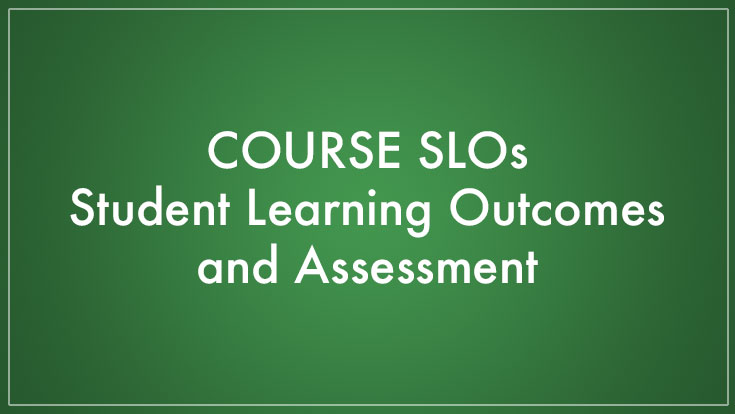
Course SLOs
SLOs are statements that help you to specify more clearly what students will know, be able to do, or be able to demonstrate when they have completed or participated in a program/activity/course/project.
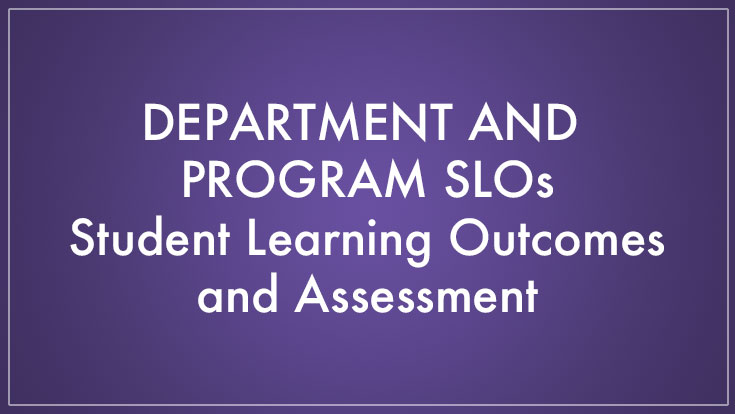
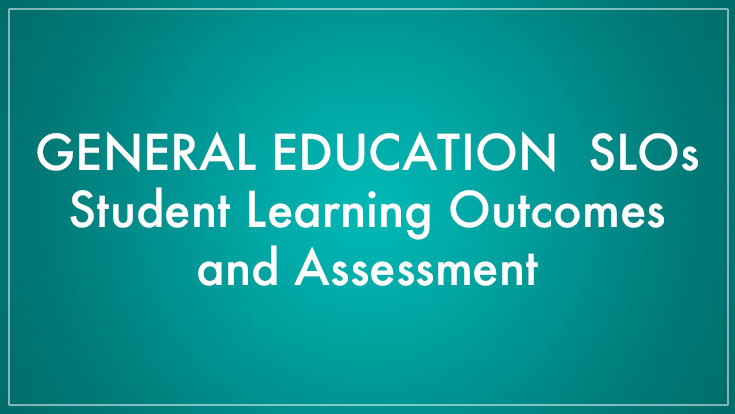
General Education SLOs
SCC’s General Education Learning Outcomes (GELOs) are the product of over a year of extensive dialogue and collaboration among faculty, staff, and administrators.
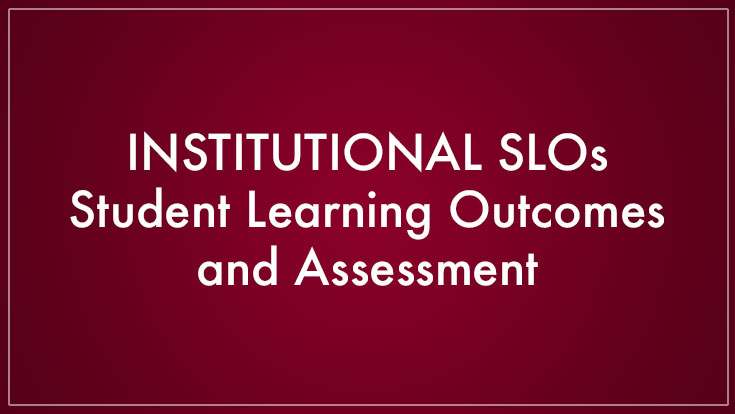
Institutional SLOs
Currently, the SCC Institutional Student Learning Outcomes are a reflection of the areas covered in the SCC General Education Student Learning Outcomes (GELOs).
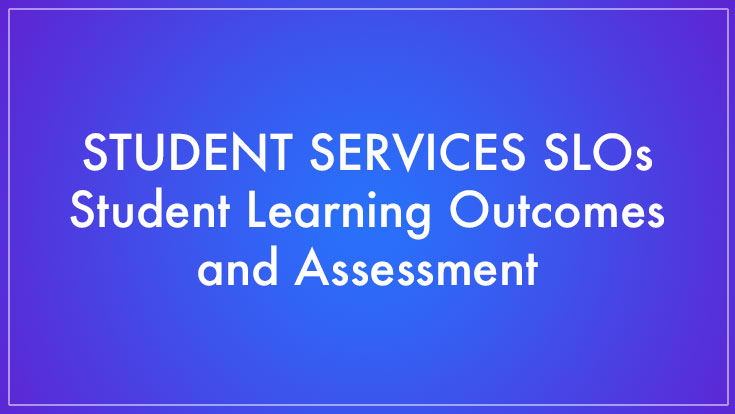
Student Services SLOs
Creating and evaluating Student Services Learning Outcomes (SSLOs) are an important part of our planning and improvement processes.
SLO Assessment Reporting System
The online reporting system can be used to create SLO reports, ProLO maps, and ProLO reports for instruction and student services areas.

